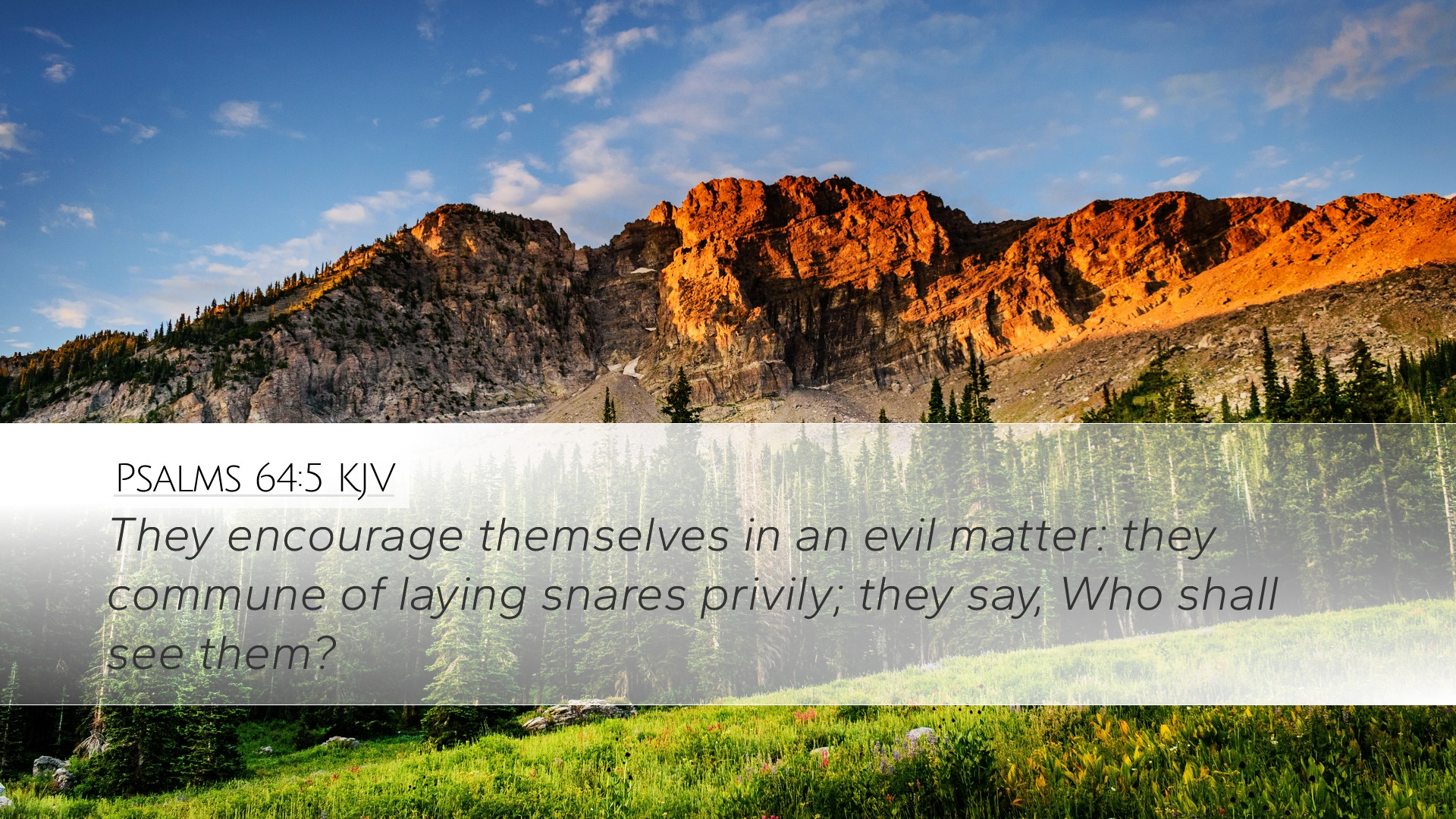Commentary on Psalms 64:5
Bible Verse: "They encourage each other in evil plans; they talk about hiding their snares; they say, 'Who will see it?'" (Psalms 64:5, NIV)
Introduction
This verse from the Book of Psalms captures a profound moment in the psalmist's observation of human behavior. It reflects on the wicked schemes that arise in secret, the collaboration among evildoers, and their sense of impunity. This commentary aims to delve into the depths of this verse, drawing insights from respected public domain commentaries to provide a robust understanding that is meaningful for pastors, students, theologians, and Bible scholars.
The Context of Psalms 64
Psalms 64 is classified as a lament. The psalmist expresses distress and seeks refuge in God against the intrigues and malice of the wicked. The entirety of the psalm emphasizes the contrast between the plots of the wicked and the deliverance that God provides to the righteous. This chapter encourages believers to trust in God’s protection amid adversity.
Divine Protection vs. Human Scheming
In this psalm, the psalmist contrasts divine protection with the cunning plans of the wicked. As highlighted by Matthew Henry, the psalm conveys a formulaic approach wherein those who plan evil often behave in a conspiratorial manner.
Analysis of the Verse
In Psalms 64:5, the phrases “encourage each other” and “evil plans” illustrate a communal aspect of malevolence. The verse implies that evil is often a collective endeavor, where individuals combine their wits and strategies against the righteous.
Encouragement in Evil Plans
The wording here suggests that wickedness is not only an isolated act but fosters an environment where individuals find support and inspiration in their malevolent intentions. Albert Barnes notes that the conspirators often find strength in numbers, which emboldens their objectives.
Hiding Their Snares
There is a deliberate intent in the phrase "hiding their snares." Adam Clarke points out that this signifies the malicious planning involved in their schemes. It reflects a secretive strategy that is crafted with the intention to ensnare the unsuspecting. The idea of hiding reveals the insidious nature of their approaches, akin to a hunter setting traps for prey.
Who Will See It?
This rhetorical question marks the height of their arrogance and their false confidence. They believe that their hidden plots will remain undiscovered. The absence of accountability to a higher moral order is striking here. Matthew Henry suggests that this mentality illustrates a profound ignorance of God’s omniscience.
Lessons for Believers
Psalms 64:5 serves as a reminder of the realities of spiritual warfare. It underscores the importance of vigilance and prayer for believers who may find themselves victims of conspiracies and malevolent plans.
- Trust in God’s Sovereignty: Believers are encouraged to remember that God sees all and will ultimately intervene.
- Awareness of Evil: Understanding that evil exists and often operates through collaboration may prepare the faithful for potential challenges.
- Prayer and Protection: The psalmist’s call to God serves as a model for individuals facing adversity, emphasizing the need for divine protection.
Theological Insights
From a theological perspective, the verse touches upon the doctrines of sin, community, and divine justice. It highlights how human behavior can devolve into collective corruption and the necessity for redemption and salvation through faith in God.
Sin and Human Nature
The collective nature of sin is evident in this verse, underscoring the tendency of humanity to succumb to evil when united by wickedness. This observation invites reflection on the fallen state of humanity and the redemptive nature of the Gospel.
Imminent Judgment
An underlying theme in the psalm is the assurance of God’s judgment upon the wicked. The psalmist ultimately rests in the belief that God will bring justice, a message that resonates throughout the Scriptures.
Conclusion
Psalms 64:5 serves as a powerful reminder of the dangers that lurk within communal evil schemes and the encouragement that arises from trusting in God. For pastors, students, and scholars, this psalm offers a text rich with themes of divine protection, the nature of sin, and the assurance of justice that sparks deep theological reflection and practical application.
May readers of this verse find solace and strength in the knowledge that while evil may scheme in secret, God sees all and stands as the ultimate protector of the righteous.


